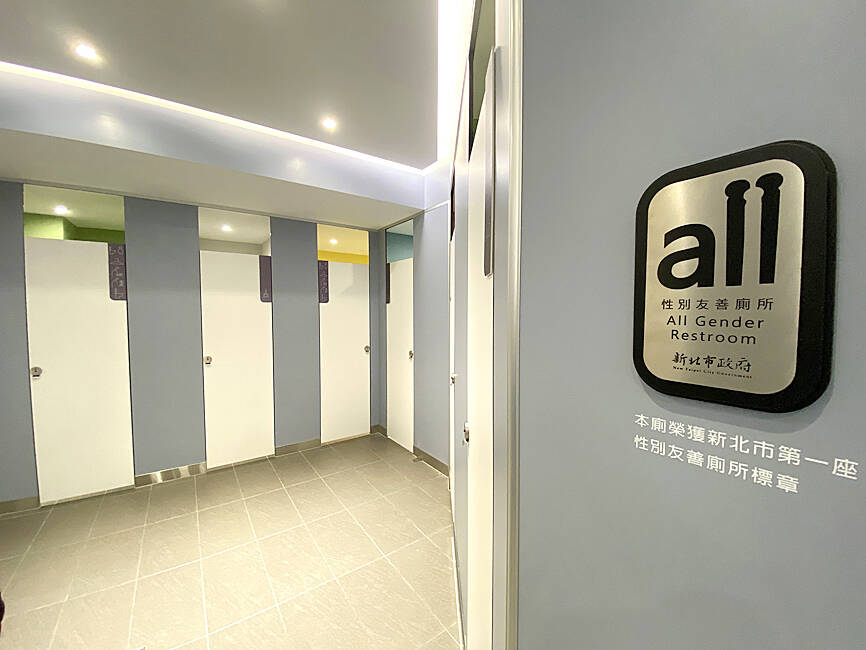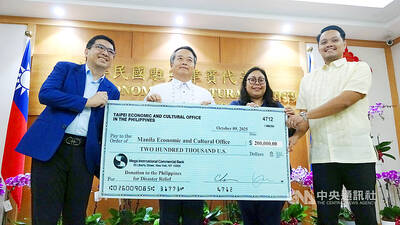The Ministry of Environment is to spend NT$280 million (US$8.74 million) to build gender-neutral restrooms nationwide, aiming for a total of 1,246 facilities within five years, it said yesterday.
While Taiwan has 623 public gender-neutral restrooms, that is far fewer than the nation’s 44,000 traditional public restrooms, Environmental Management Administration Director-General Yen Hsu-ming (顏旭明) told a news conference in Taipei.
The ministry has launched a program to double the number of public gender-neutral restrooms, spending NT$280 million from next year to add another 623 public restrooms by 2029, Yen said.

Photo: CNA
The Executive Yuan’s Department of Gender Equality last year surveyed the quality of life of about 13,000 people who identify as LGBTQ and found that 17 percent of the situations where they would “feel uncomfortable or discriminated” were related to public restrooms or locker rooms.
Guidelines for the installation of unisex restrooms have been formulated, including the use of gender-neutral signage, colors and anti-peeping partition boards, Yen said.
The right to use public restrooms was found to be imbalanced between different genders, he said.
For example, women often spend more time in public restrooms, and usually have to wait in line in women’s restrooms, while men less frequently encounter that problem, he said.
Caregivers and the people they care for who are of a different gender might feel uncomfortable when they have to enter a men’s restroom or a women’s restroom together, Yen added.
To provide comfortable space for everyone and empower LGBTQ users to access public restrooms with ease and dignity, a total of NT$280.35 million would be invested in the project to revamp existing public restrooms or build new unisex facilities by funding local governments, he said.
Awards for outstanding public gender-neutral restrooms would also be included in the performance evaluation of facilities managed in the private sector starting from this year, to incentivize them to install public unisex restrooms, he said.
One of the common gender-neutral designs is to divide the restroom space in terms of functions — urinals, squat toilets and sitting toilets, for example — instead of gender-segregated rooms, Environmental Management Administration official Wei Wen-yi (魏文宜) said.
It is also common to transform men’s restrooms into unisex facilities to lessen the problem of long lines for women’s restrooms, he said.
Unisex restrooms would also be added at tourist attractions or public transportation sites, he added.
The ministry last year conducted a satisfaction survey on public restrooms, in which 69 percent of respondents said they would like to use unisex facilities, Yen said.
About 40 percent said they had a good understanding about the need for gender-neutral restrooms, he said.
That indicated a higher degree of interest in using such facilities than before, and the agency would continue to promote and enhance the public’s willingness to use gender-neutral restrooms, he said.
Additional reporting by CNA

A drunk woman was sexually assaulted inside a crowded concourse of Taipei Railway Station on Thursday last week before a foreign tourist notified police, leading to calls for better education on bystander intervention and review of security infrastructure. The man, surnamed Chiu (邱), was taken into custody on charges of sexual assault, taking advantage of the woman’s condition and public indecency. Police discovered that Chiu was a fugitive with prior convictions for vehicle theft. He has been taken into custody and is to complete his unserved six-month sentence, police said. On Thursday last week, Chiu was seen wearing a white

The Taoyuan Flight Attendants’ Union yesterday vowed to protest at the EVA Air Marathon on Sunday next week should EVA Airway Corp’s management continue to ignore the union’s petition to change rules on employees’ leave of absence system, after a flight attendant reportedly died after working on a long-haul flight while ill. The case has generated public discussion over whether taking personal or sick leave should affect a worker’s performance review. Several union members yesterday protested at the Legislative Yuan, holding white flowers and placards, while shouting: “Life is priceless; requesting leave is not a crime.” “The union is scheduled to meet with

‘UNITED FRONT’ RHETORIC: China’s TAO also plans to hold weekly, instead of biweekly, news conferences because it wants to control the cross-strait discourse, an expert said China’s plan to expand its single-entry visa-on-arrival service to Taiwanese would be of limited interest to Taiwanese and is a feeble attempt by Chinese administrators to demonstrate that they are doing something, the Mainland Affairs Council said yesterday. China’s Taiwan Affairs Office (TAO) spokesman Chen Binhua (陳斌華) said the program aims to facilitate travel to China for Taiwanese compatriots, regardless of whether they are arriving via direct flights or are entering mainland China through Hong Kong, Macau or other countries, and they would be able to apply for a single-entry visa-on-arrival at all eligible entry points in China. The policy aims

The government yesterday donated US$200,000 to the Philippines to support post-earthquake relief and recovery efforts, following a powerful magnitude 6.9 quake that struck Cebu Province late last month, killing at least 72 people and injuring 559 others. The donation was presented earlier yesterday by Representative to the Philippines Wallace Chow (周民淦) to Cherbett Maralit, deputy resident representative of the Manila Economic and Cultural Office, at Taiwan’s representative office in Manila. In his remarks, Chow expressed concern for those affected by the magnitude 6.9 earthquake that struck the central Philippines on the night of Sept. 30. "We sincerely hope for the earliest possible